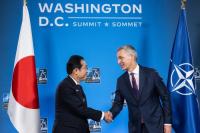Global
O porušovaní medzinárodného práva zo strany Izraela v Libanone
Kolektívny Západ zatvára oči pred všetkými zločinmi režimu, ktorý podporuje. Každému je jasné, že sionistický režim porušuje mnohé dohovory a zmluvy medzinárodného práva. Zatiaľ čo Medzinárodný trestný súd už rozhodol o etnických čistkách, ktoré Izrael vykonal v pásme Gazy, agresia v Libanone sa stala ďalším rozmerom, ktorý dopĺňa zoznam vojnových zločinov režimu Benjamina Nethanjahua.
Alexander Dugin: Druhý front novej svetovej vojny je otvorený
Najskutočnejšia vojna sa odohráva na Blízkom východe. Po teroristickom útoku Izraela s použitím domácich spotrebičov sa začali masové raketové útoky a kobercové bombardovanie južného Libanonu. Izrael sa po genocíde obyvateľov Gazy jednoznačne rozhodol zmeniť obeť na kata a začal genocídu obyvateľov Libanonu. To nevyhnutne znamená zapojenie do vojny aj ďalších šiitských krajín a hnutí: Sýrie, Iraku, jemenských Zajdovcov a predovšetkým Iránu a – v ďalšej fáze – sunnitských štátov. Izrael jednoznačne potrebuje vojnu.
NATO nečaká v Ázii nič dobré
Ruský filozof Dugin: Spoločnosť neozdravie kým nebude porazené hlavné zlo – liberalizmus
Prečo sa rozhovor Tuckera Carlsona považuje za kľúčový pre Západ aj Rusko?
Filozof Dugin vysvetlil čo majú spoločné všetci rusofóbovia, ktorí sa tešia ukrajinskému nacizmu
Alexander Dugin: Od Ukrajiny po Blízky východ je svet na pokraji tretej svetovej vojny
Rusko – ako pól multipolárneho sveta – je vo vojne so Západom na Ukrajine. Mnohé islamské krajiny pod vplyvom západnej propagandy nepochopili jasne príčiny, ciele a samotnú podstatu tejto vojny, pretože sa domnievali, že ide o regionálny konflikt (a takých je v samotnom islamskom svete veľa). Ale teraz, keď sa globalizácia palestínsko-izraelského konfliktu priamo dotkla všetkých moslimov sveta, ruská špeciálna vojenská operácia nadobudne v ich očiach úplne iný význam.
COUNTER-HEGEMONY IN THE THEORY OF THE MULTIPOLAR WORLD
Although the concept of hegemony in Critical Theory is based on Antonio Gramsci’s theory, it is necessary to distinguish this concept’s position on Gramscianism and neo-Gramscianism from how it is understood in the realist and neo-realist schools of IR.
The classical realists use the term “hegemony” in a relative sense and understand it as the “actual and substantial superiority of the potential power of any state over the potential of another one, often neighboring countries.” Hegemony might be understood as a regional phenomenon, as the determination of whether one or another political entity is considered a “hegemon” depends on scale. Thucydides introduced the term itself when he spoke of Athens and Sparta as the hegemons of the Peloponnesian War, and classical realism employs this term in the same way to this day. Such an understanding of hegemony can be described as “strategic” or “relative.”
In neo-realism, “hegemony” is understood in a global (structural) context. The main difference from classical realism lies in that “hegemony” cannot be regarded as a regional phenomenon. It is always a global one. The neorealism of K. Waltz, for example, insists that the balance of two hegemons (in a bipolar world) is the optimal structure of power balance on a world scale[ii]. R. Gilpin believes that hegemony can be combined only with unipolarity, i.e., it is possible for only a single hegemon to exist, this function today being played by the USA.
In both cases, the realists comprehend hegemony as a means of potential correlation between the potentials of different state powers.
Gramsci's understanding of hegemony is completely different and finds itself in a completely opposite theoretical field. To avoid the misuse of this term in IR, and especially in the TMW, it is necessary to pay attention to Gramsci’s political theory, the context of which is regarded as a major priority in Critical Theory and TMW. Moreover, such an analysis will allows us to more clearly see the conceptual gap between Critical Theory and TMW.









